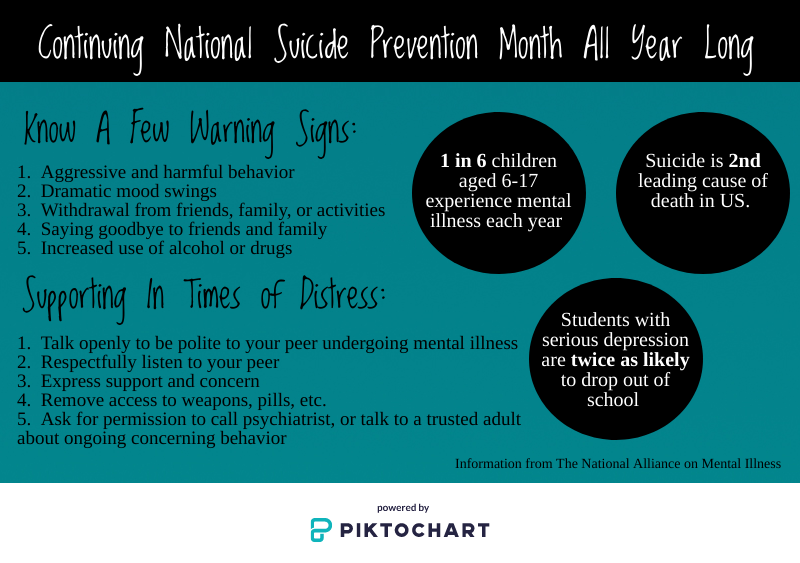Suicide prevention is needed every month, not just once a year.
Here are the warning signs and support strategies to prevent suicide and manage stress.
October 23, 2019
In a politically polarized country, it is routine to advocate passionately for a cause when tragedy strikes, and then forget about the issue in the following weeks. It is also too common for individuals to be so consumed by their everyday lives that they minimize the intensity of calamities, such as shootings or suicides, and treat the victims as statistics time after time.
This is a systemic national issue. We cannot continue to treat tragedies as mere statistics or be negligent in our activism. We are obligated to continue remembering victims and to continue the dialogue about pressing issues that continue to affect our lives and the lives of those around us. We must change our attitude towards consistently advocating for causes now.
September was National Suicide Prevention Month, meaning that when students across the country returned from summer, administrators underscored the importance of maintaining mental health. Specifically, they informed students about the warning signs of suicide and measures to prevent suicide, particularly in stressful and overwhelming environments.
Although the CESJDS administration did not do anything to address the month’s notable cause, it does not mean it still cannot.
We must take the responsibility to educate ourselves about the prevalence of the taboo topic, regardless of the month. Suicide is not limited to one month, so our attention to the issue should not be limited either.
By attending clubs such as the Mental Health Awareness Club every Thursday during CT to learn about destigmatizing mental illnesses or understanding how to maintain robust mental health, or by reading posters posted on the walls between classes, the student body and faculty can gain knowledge of the warning signs and risk factors of suicide. In doing so, students will understand how to appropriately help a person undergoing mental health struggles or contemplative thoughts.
This is not a recommendation to be vocal and educated about the suicide epidemic, but rather a call to action to help save our peers.
According to the National Alliance on Mental Illness (NAMI), one in five adults living in the US will experience mental illness each year, driving suicide to be the second leading cause of death among individuals aged 10-34 years old in the U.S.
With such a high prevalence, we must divert from stigmatizing mental illnesses or suicide within our community. We must establish a safe, accepting and educated community at all times, regardless of the timestamp after a tragedy or if it is the month’s “cause.”
As a community, we must be the voices for individuals who no longer have one.
If you or someone you know is struggling or in an emergency, call The National Suicide Prevention Lifeline at 800-273-TALK (8255) or call 911 immediately.








